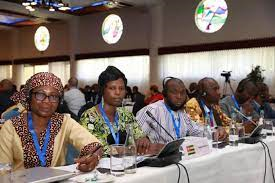Daily News Analysis.
Retail Inflation : Report (GS-3)
News: Retail Inflation increased significantly in July 2023, rising to 7.44%, creating a Goldilocks scenario for India and raising concerns among savers and investors about the state of the economy.
- In a Goldilocks scenario, the economy is in a perfect situation when it is neither growing nor shrinking excessively.
- A Goldilocks economy has moderate economic growth that keeps prices from rising too high while also averting a recession.
- The benchmark Sensex index currently sits at 65,000 points, while the predicted GDP (Gross Domestic Product) growth for 2023–24 is 6.5%.
- On the other hand, it is anticipated that the rates for bank deposits and gold will not change during the next few months.
- The Reserve Bank of India (RBI) expects inflation to exceed its tolerance level of 4% and remain above 5% through the first quarter of 2024–2025, with a potential increase to 6.2% in the current quarter (July–Sept. 2023).
- For a few more months, it’s anticipated that food costs would stay high. According to data for July, prices for vegetables have increased by 37.3%, along with those for cereals, pulses (both up by 13%), spices (up by 21.6%), and milk (8.3%).
- Government initiatives and the emergence of new crops are anticipated to finally reduce this pressure. The potential of a rate drop has been delayed to the following fiscal year (2024–2025) due to the higher inflation forecasts.
- In its upcoming meeting, the Monetary Policy Committee (MPC) is likely to keep policy rates unchanged, with the first rate reduction possibly arriving in the following fiscal year. Inflation and high interest rates haven’t stopped the Indian market from performing well.
- India has outperformed other markets, helped by promising profit expectations and stable macroeconomic conditions.
Kampala Declaration On Climate Change: (GS-2)
News: The adoption of the Kampala Ministerial Declaration on Migration, Environment, and Climate Change (KDMECC) by 48 African nations is an important step towards addressing the connection between climate change and human movement on the continent.
- At a Conference of States that Kenya and Uganda co-hosted, the decision was considered. The UN Framework Convention on Climate Change (UNFCCC) and the International Organization for Migration (IOM) both backed the idea.
- Out of the confusion and upheaval that Western Europe experienced after the Second World War, IOM was founded in 1951. Africa is particularly susceptible to the effects of climate change, which increases migration as a result of catastrophic weather occurrences.
- KDMECC was first signed in July 2022 in Kampala, Uganda, by 15 African nations. On September 4, 2023, in Nairobi, Kenya, the member states of the KDMECC-AFRICA are anticipated to sign it.
- The Declaration is the first all-encompassing, action-focused framework developed by Member States to address climate-induced mobility in a realistic and useful way.
- The KDMECC-AFRICA will make sure that the extended proclamation gives emphasis to all voices, especially those of youth, women, and people in vulnerable circumstances.
Dholpur-Karauli Tiger Reserve : National Tiger Conservation Authority Approval (GS-2)
News: The Dholpur-Karauli Tiger Reserve in the state of Rajasthan has received clearance from the National Tiger Conservation Authority (NTCA).
- It has established itself as the state of Rajasthan’s fifth tiger reserve, behind Mukundra Hills, Ramgarh Vishdhari, Ranthambore, and Sariska.
- The term “Tiger Reserve” refers to a protected area set aside for the preservation of the striped large cats (tigers). A tiger reserve, however, could also be a national park or a wildlife refuge.
- Another national park is the Sariska Tiger Reserve. It is thus because the area was first made into a national park before being used for tiger protection.
- According to Section 38V of the Wildlife (Protection) Act, 1972, Tiger Reserves are declared by State Governments on the recommendation of the National Tiger Conservation Authority.
- India currently has 54 Tiger Reserves in total (the Dholpur-Karauli Tiger Reserve being the newest addition).
- The Wildlife (Protection) Act of 1972, as amended in 2006, established the NTCA as a statutory body under the Ministry of Environment, Forests, and Climate Change, with the purpose of enhancing tiger conservation.
Objectives
- Granting Project Tiger formal authority to make complying with its instructions legal.
- By creating a foundation for MoUs with States inside our federal system, we can encourage the Center-State’s accountability in the management of Tiger Reserves.
Fast Track Special Courts: (GS-3)
News: The Eleventh Finance Commission first suggested fast track courts (FTCs) in 2000 to “substantially reduce, if not eliminate, pendency in the district and subordinate courts over the next five years.”
- In response to the study, the Centre established 1,734 more courts over a five-year period in various states. 2011 saw the end of central government financing for expedited legal proceedings.
- The Union Government established a “Nirbhaya Fund” in response to the December 2012 gangrape and murder case, revised the Juvenile Justice Act of 2015, and established expedited Mahila Courts (a Special Court).
- Following that, FTCs were established for rape cases in a few more states, including Uttar Pradesh, Jammu and Kashmir, Bihar, etc. Fast Track Special Courts (FTSCs) are specialized courts that are meant to ensure quick justice delivery.
- They hold trials quickly and have a higher clearing rate than conventional courts.
- In order to expeditiously resolve cases of rape under the Indian Penal Code (IPC) and offences under the POCSO Act, the government authorized a plan in 2019 that called for the establishment of 1,023 FTSCs around the nation.
- Additionally, it improves the system for deterring sexual offenders. By June 2023, the FTSCs had resolved more than 1.74 lakh rape and POCSO Act cases amicably.
- This demonstrates the important role that these specialized courts play in delivering prompt justice to sexual assault victims. Currently, 763 FTSCs are operational in 29 States and Union Territories.








